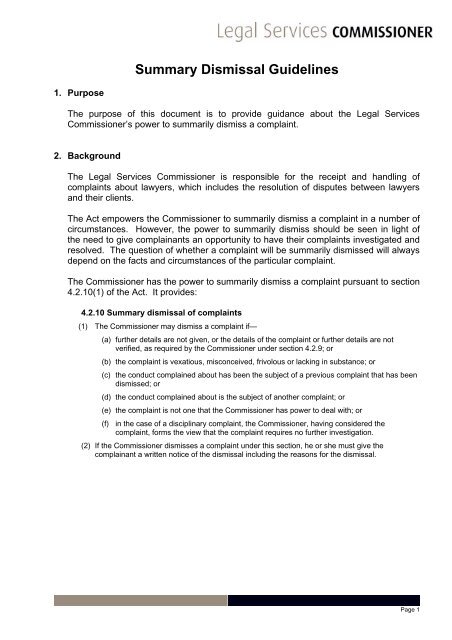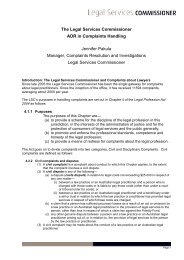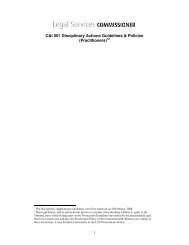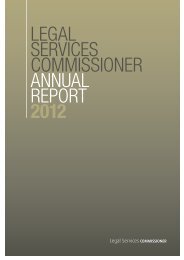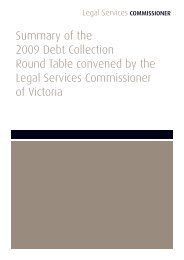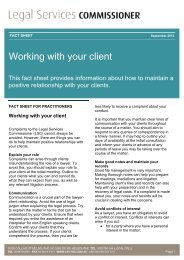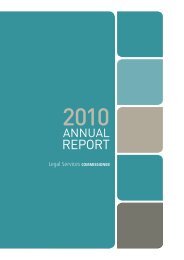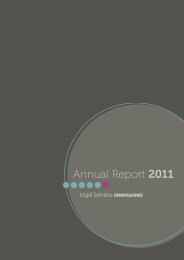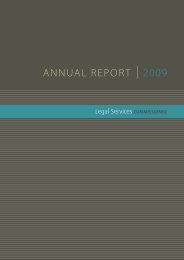Summary Dismissal Guidelines - Legal Services Commissioner
Summary Dismissal Guidelines - Legal Services Commissioner
Summary Dismissal Guidelines - Legal Services Commissioner
- No tags were found...
Create successful ePaper yourself
Turn your PDF publications into a flip-book with our unique Google optimized e-Paper software.
4. When can the <strong>Commissioner</strong> summarily dismiss a complaint under s4.2.10?The <strong>Commissioner</strong> may summarily dismiss a complaint in the following circumstances:(a)If further details are not given, or the details of the complaint or further detailsare not verified, as required by the <strong>Commissioner</strong> under section 4.2.9;Generally, the <strong>Commissioner</strong> would provide a complainant with twoopportunities to respond to a request for further information before summarilydismissing a complaint under this sub-section.(b)If the complaint is vexatious, misconceived, frivolous or lacking in substance;The terms vexatious, misconceived, frivolous and lacking in substance are notmutually exclusive. A complaint may, for example, be both vexatious andfrivolous.(c)If the conduct complained about has been the subject of a previous complaintthat has been dismissed;Generally, the <strong>Commissioner</strong> would only summarily dismiss a complaint underthis sub-section where the complaint was made by or on behalf of the sameperson who made the previous complaint.(d)If the conduct complained about is the subject of another complaint;Generally, the <strong>Commissioner</strong> would only summarily dismiss a complaint underthis sub-section where the relevant complaints were made by or on behalf of thesame person.(e)If the complaint is not one that the <strong>Commissioner</strong> has power to deal with;There are a number of reasons why the <strong>Commissioner</strong> may lack the power todeal with a complaint. The <strong>Commissioner</strong> may lack the power to deal with acomplaint if, for example:• the complaint relates to legal costs exceeding $25,000 in respect of anyone matter, and so falls outside the definition of a civil dispute in section4.2.2(2); 1 or• to the extent that the complaint involved a costs dispute, the complaint wasnot made within 60 days after legal costs were payable, or if an itemisedbill was requested in respect of those costs, within 30 days after therequest was complied with; or• the complaint was made 6 years after the conduct complained aboutallegedly occurred.1 <strong>Legal</strong> Profession Act 2004, s 4.2.2(2)(a).Page 3
(f)If in the case of a disciplinary complaint, the <strong>Commissioner</strong>, having consideredthe complaint, forms the view that the complaint requires no further investigation*This sub-section applies only to disciplinary complaints. It cannot be used tosummarily dismiss a civil complaint.5. What must the <strong>Commissioner</strong> do after summarily dismissing a complaint under s4.2.10(1)?If the <strong>Commissioner</strong> decides to summarily dismiss a complaint under s4.2.10(1), thenunder s4.2.10(2) the <strong>Commissioner</strong> must provide the complainant with a written noticesetting out the following information:• that the <strong>Commissioner</strong> has decided to summarily dismiss the complaint;and• the reasons for the dismissal.6. Charter of Human RightsThe Charter of Human Rights and Responsibilities Act 2006 affects the interpretation ofall statutory provisions. Section 32 provides that so far as it is possible to do soconsistently with their purpose, all statutory provisions must be interpreted in a way thatis compatible with human rights.In making a decision to summarily dismiss a complaint, the <strong>Commissioner</strong> considersrelevant human rights (if any) set out in the Charter of Human Rights andResponsibilities Act 2006. This includes section 8, which provides every person withthe right to recognition and equality before the law; section 13, which provides for theright to privacy and reputation; and section 24, which provides that a person chargedwith a criminal offence or a party to a civil proceeding has the right to have the chargeor proceeding decided by a competent, independent and impartial court or tribunal aftera fair and public hearing.Page 4


